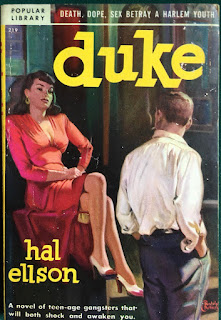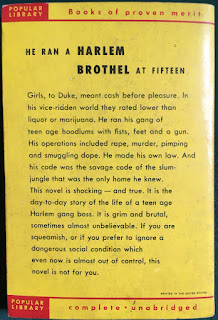Duke is an odd book in its style and structure. The narrative is repetitive. Duke is the leader of his gang and there is a cycle of war and peace between them and their rivals from the next neighbourhood. Duke also runs weed for a spanish dealer, making deliveries via subway and foot all over the city, especially Brooklyn. The book is an ongoing series of these incidents without much of a larger narrative. It's kind of a summer in the life of a kid in Harlem. He tries to write it in the slang (it's first person), which may be authentic but feels forced and artificial (not helped by the extensive glossary at the beginning) at first. As it goes on, though, there is a rhythm to the book. It starts to feel almost like a poem. You do feel for Duke and his stressful, tiring life.
The sympathy is reinforced by the growing prominence his psychology takes as the narrative goes on. Duke struggles with fears and anxieties. These are quite interesting. He hears his name being called on the streets and nobody is there. He fears his hands are shrinking. He sees the face of the spanish girl Gigi that he loved and whose father moved her away because he was black. He sees a one-legged man who looks at him funny and scares him. All these neuroses are much more terrifying to Duke than the undercover cops that are really tailing him. At first it feels a bit simplistically Freudian, but it gets weirder and weird and he even has a full breakdown where he runs away and sleeps in the basement of a house he breaks into and then ends up with some hoboes. His recovery is so sudden that it really does seem like he is suffering from schizophrenia that is only going to get worse.
So I hate to admit it but Duke is sort of an "awakening" book, but not in a cloying pushy way. I would rather read this book actually written by a young black kid from Harlem for many reasons but for a white guy from 1950, this book does give you a compelling and sympathetic look into such a person's life.






No comments:
Post a Comment